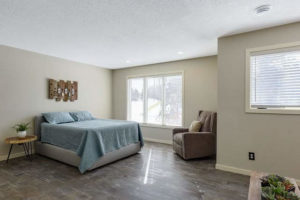
A diagnosis of Alzheimer’s or another form of dementia is life-changing, and that’s true for a loved one’s family member as well. At some point, family members may realize the best way they can help their loved one is by finding specialized care. It’s not an easy decision, but it’s truly an act of love when it’s made for the right reasons. If you’ve come to understand that letting someone else care for your loved one is what’s best for them, here are five tips for transitioning your loved one to private memory care.
While you will have visited a private memory care home before deciding it’s the right one, it’s still new to your loved one. Planning a few visits together to tour the home, meet the staff and residents, and perhaps attend an activity, gives your loved one a chance to become more familiar with new surroundings. While a loved one with dementia may not remember these visits, it’s important to begin this new stage with a sense of positivity and familiarity.
Here at Syncare Memory Suites, a specialized memory care home in Minnesota, we understand the importance of comprehensive on-boarding. That means we’ll work closely with you to understand as much as we can about your loved one. We want to know everything about likes and dislikes, a typical day, their normal routine, and their preferred activities. Being upfront and frank about this and other information you feel we should understand makes it easier for us to care for your loved one in a way that’s familiar and comforting.

While the actual moving of your loved one’s belongings into their new room can be chaotic, the goal should be to create a space that’s reminiscent of home. Personal items, like a favorite blanket, personal photographs, treasured items, even beloved pieces of furniture, should be arranged in a way that reminds your loved one of a familiar, comforting space. The goal isn’t a brand new room full of brand new things, but a space that will put your loved one at ease.
Visiting often is important. You’ll be comforted to see how well you loved one is doing in their structured new environment, and they’ll enjoy the company. If you had shared routines, such as watching a particular television show, taking a morning walk, playing a specific board game, or just sharing a meal, do what you can to maintain that. You should also do your best to stay positive. It’s understandable that a transition like this is full of mixed emotions for both of you, but modeling positivity will be helpful to your loved one.
As you and your loved one both adjust to this new way of life, you’ll find comfort in information. Make arrangements with a primary caregiver for regular updates on your loved one during the first few days or weeks. That way, you can address any questions or concerns from the staff and you’ll also learn how your loved one is adjusting to the new home.
For more information about the specialized memory care we offer here at Syncare, contact us today. We understand the enormity of a decision like this, and we’re here to help.